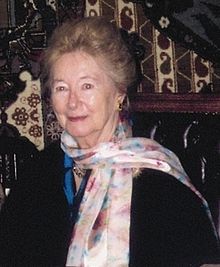Anna-Teresa Tymieniecka
| Anna-Teresa Tymieniecka | |
|---|---|
 |
|
| Born |
February 28, 1923 Marienfließ, Pomerania, Germany |
| Died | June 7, 2014 (aged 91) Hanover, New Hampshire, U.S. |
| Residence | Hanover, New Hampshire, U.S. |
| Nationality | Polish-American |
| Alma mater | Jagiellonian University |
| Era | Contemporary philosophy |
| Region | Western Philosophy |
| School | Phenomenology |
| Institutions |
Oregon State College Pennsylvania State University Radcliffe College St. John's University |
|
Main interests
|
Epistemology, ontology, aesthetics |
Anna-Teresa Tymieniecka (February 28, 1923 – June 7, 2014) was a Polish, later American philosopher, phenomenologist, founder and president of The World Phenomenology Institute, and editor (since its inception in the late 1960s) of the book series Analecta Husserliana. She had a thirty-year friendship (and occasional academic collaboration) with Pope John Paul II.
Anna-Teresa Tymieniecka was born into an aristocratic Polish-French family. Her acquaintance with philosophy started at an early age with reading of the fundamental work of Kazimierz Twardowski, the founder of the Lvov–Warsaw Philosophical School, Zur Lehre vom Inhalt und Gegenstand der Vorstellungen (On the content and object of presentations), as well as works by Plato and Bergson. To the philosophy of the latter she was introduced by her mother, Maria-Ludwika de Lanval Tymieniecka.
After the end of World War II she began systematic studies of philosophy at the Jagiellonian University in Kraków under the guidance of Roman Ingarden, student of the famous teachers Kazimierz Twardowski and Edmund Husserl. Simultaneously she studied at the Kraków Academy of Fine Arts.
After completing the entire university course within two years she moved to Switzerland to continue studies under another important Polish philosopher and logician, Józef Maria Bocheński, at the University of Fribourg. Her doctoral study, dedicated to explorations of the fundamentals of phenomenology in Nicolai Hartmann and Roman Ingarden's philosophies, was later published as "Essence and Existence" (1957). She obtained her second Ph.D., this time in French philosophy and literature, at the Sorbonne in 1951.
...
Wikipedia
